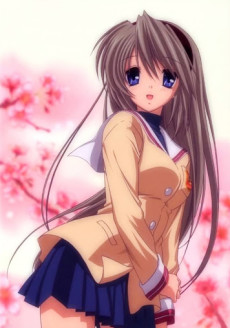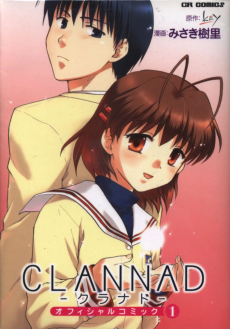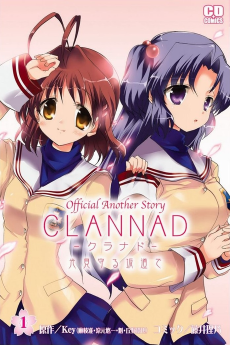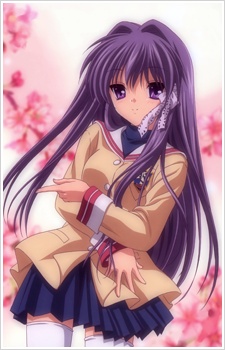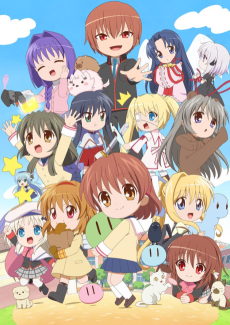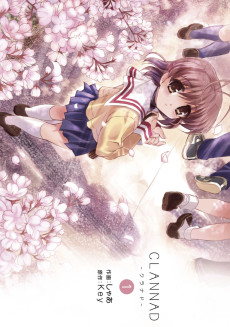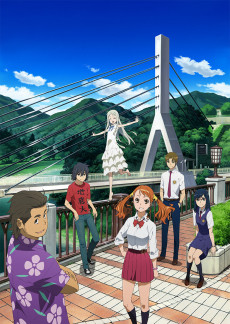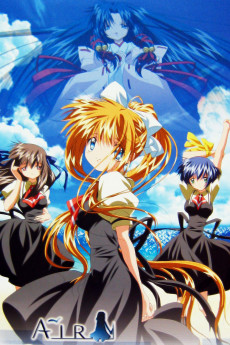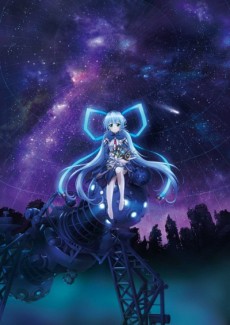CLANNAD
STATUS
COMPLETE
EPISODES
23
RELEASE
March 28, 2008
LENGTH
24 min
DESCRIPTION
Tomoya is a bitter, third year high school student. His mother passed away, causing his father to resort to alcohol and gambling. Tomoya is distant with his father and has become a delinquent in the years since his mother's death. Walking to school, he meets Nagisa Furukawa who is a year older but is repeating the grade due to illness. She is alone, as most of her friends have moved on. The two begin hanging out, and as time goes by, Tomoya finds his life shifting in a new direction.
(Source: Sentai Filmworks)
CAST
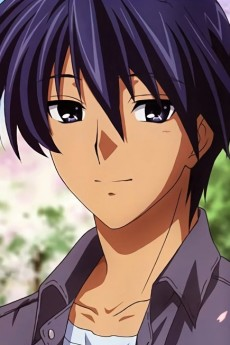
Tomoya Okazaki
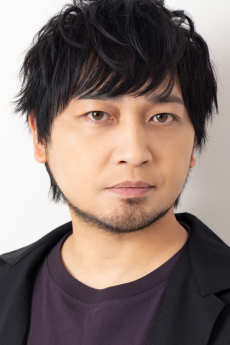
Yuuichi Nakamura
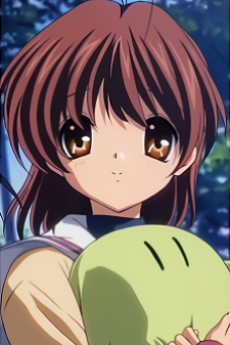
Nagisa Furukawa
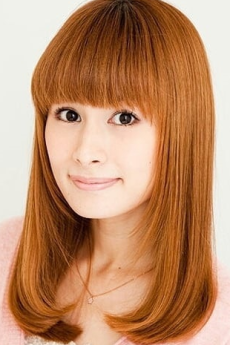
Mai Nakahara
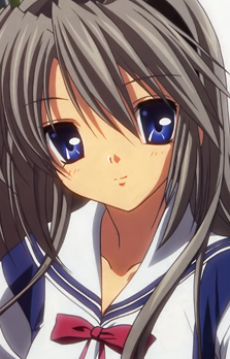
Tomoyo Sakagami

Houko Kuwashima
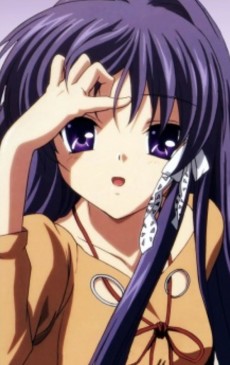
Kyou Fujibayashi

Ryou Hirohashi
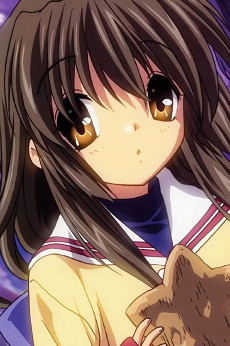
Fuuko Ibuki
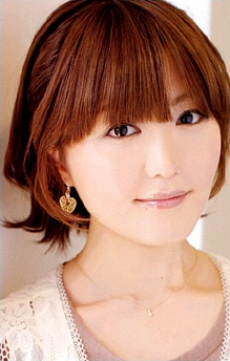
Ai Nonaka
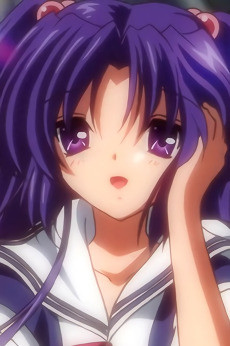
Kotomi Ichinose
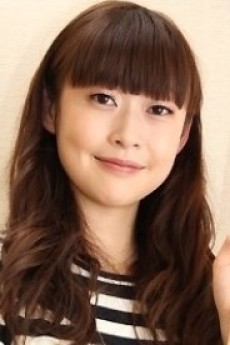
Mamiko Noto
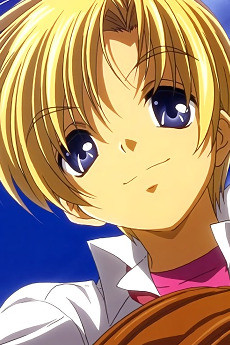
Youhei Sunohara
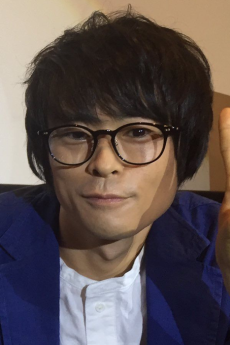
Daisuke Sakaguchi
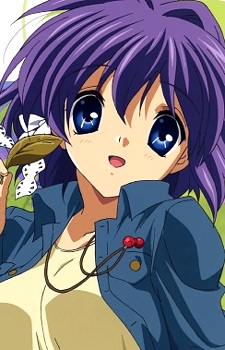
Ryou Fujibayashi

Akemi Kanda
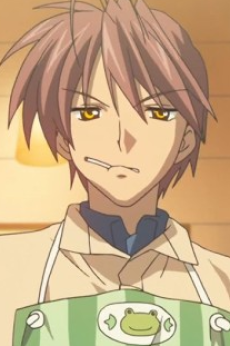
Akio Furukawa
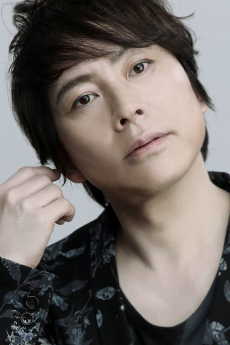
Ryoutarou Okiayu
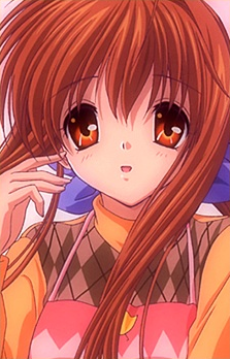
Sanae Furukawa
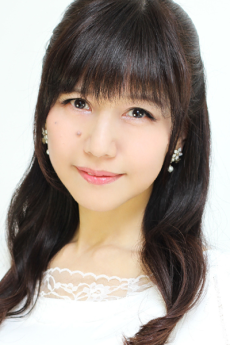
Kikuko Inoue
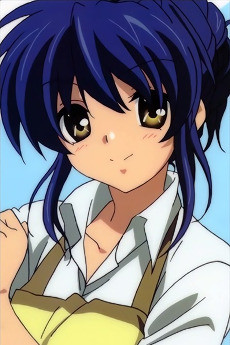
Misae Sagara
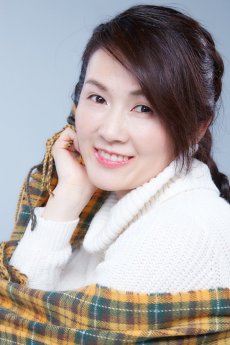
Satsuki Yukino
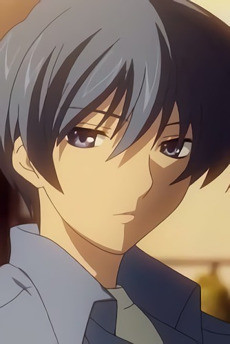
Yusuke Yoshino
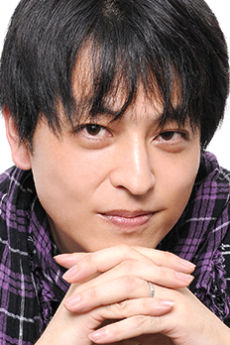
Hikaru Midorikawa
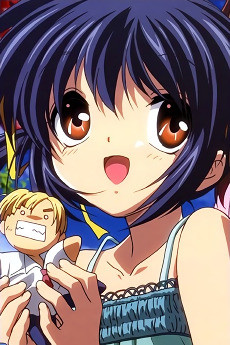
Mei Sunohara
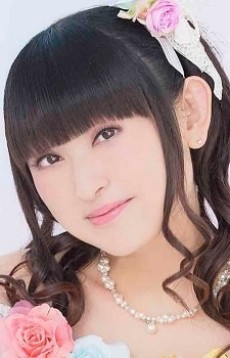
Yukari Tamura
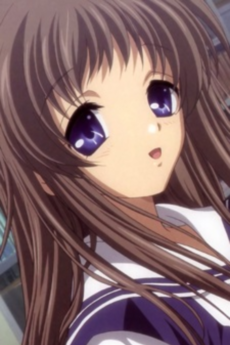
Yukine Miyazawa
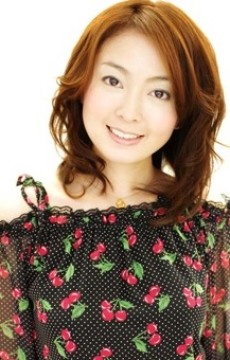
Atsuko Enomoto
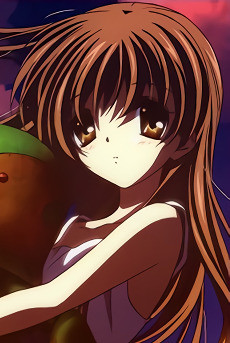
Nazo no Shoujo
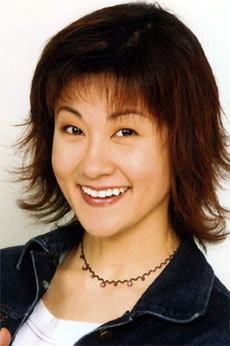
Tomoko Kawakami
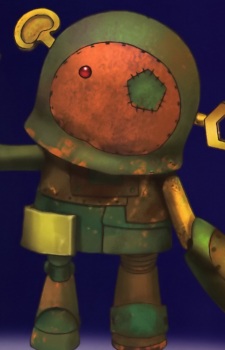
Garakuta no Ningyou
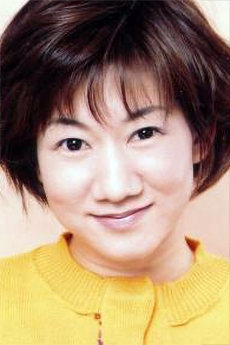
Aki Uechi
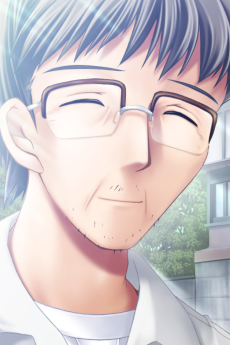
Naoyuki Okazaki
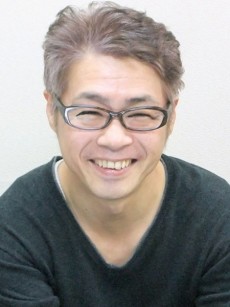
Hiroshi Naka
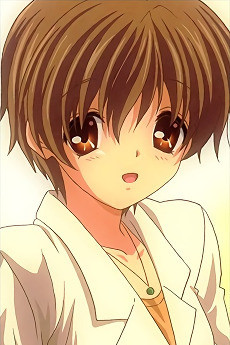
Kouko Ibuki
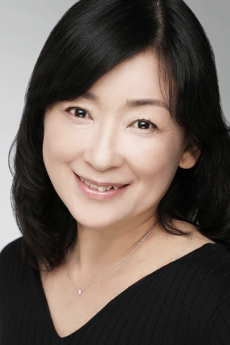
Yuuko Minaguchi
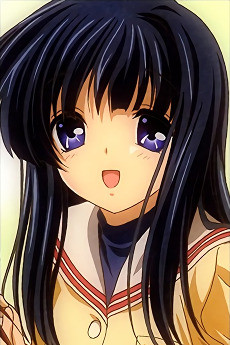
Rie Nishina
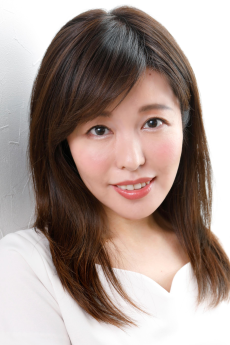
Mai Aizawa
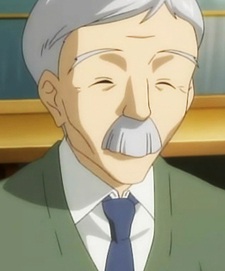
Toshio Koumura
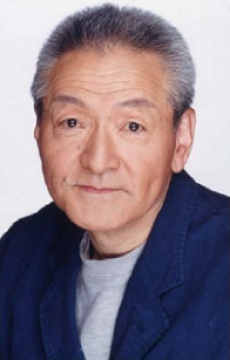
Takeshi Aono
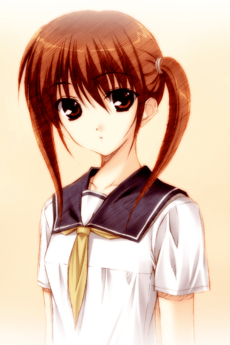
Kanako
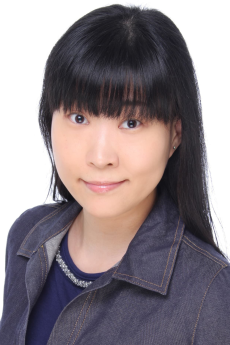
Keiko Suzuki
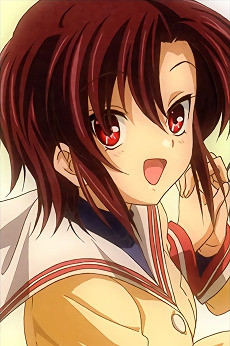
Sugisaka

Ai Bandou
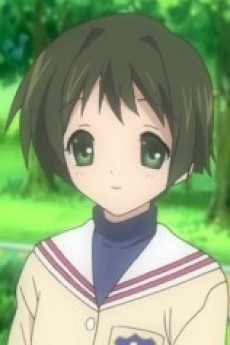
Harada
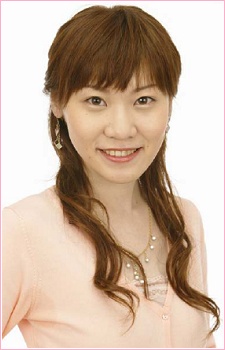
Eri Yasui

Takafumi Sakagami

Keiko Suzuki
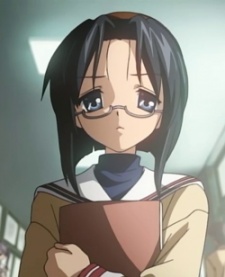
Mitsui
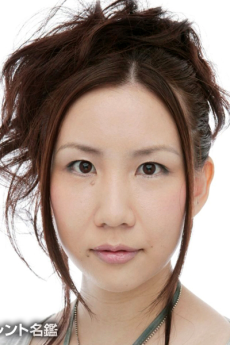
Miho Saiki
EPISODES
Dubbed
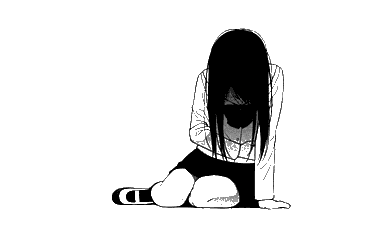
Not available on crunchyroll
RELATED TO CLANNAD
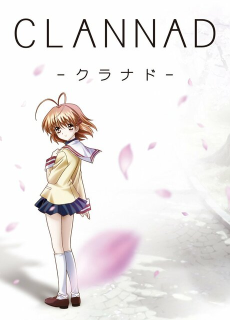 MOVIE DramaClannad Movie
MOVIE DramaClannad Movie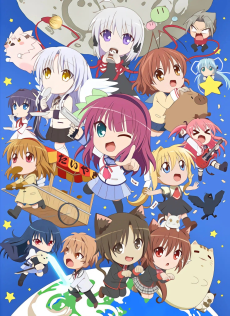 TV SHORT ComedyKaginado Season 2
TV SHORT ComedyKaginado Season 2REVIEWS

RoundChestnut
90/100Determining if this anime is right for you.Continue on AniListClannad and Clannad After Story Review/Analysis
Hello, my name is TheRoundChestnut.
Due to the success of my Tengen Toppa Gurren Lagann review, I decided that I wanted to make more reviews to give the people who are hesitant on watching a certain series reason why it is good or bad.This time, I am conducting a review on Clannad.
This review will discuss what themes it expresses, the character which upholds its themes, and the uniqueness of this anime. I, then, will discuss why this anime is not for everyone, and shall give some suggestions on if this is anime is right for you.
I will be discussing more of its story rather than its animation and music, etc.
(This review will contain minor spoilers, but not anything too bad)
The reason why this anime is beloved for what it is is the amount of depth between each and every character, whether that leads into romance or even feuds within their families. The story is centered around Okazaki Tomoya, a delinquent who is wandering through his final high school years and constantly aggravated on the dullness of his own life. The reason why the premise of the beginning is important is because the viewers realize that the main character is at his grey point (the lowest point) of his life and sets up a story of change. This is already more hooking than most romance animes out there, because the viewers are able to experience the change of Tomoya from the lowest point of his life and eventually to his peak.
The characters that are introduced through out the story are represented in Tomoya's expansion of his relationships with other people. His build of relationships becomes important throughout both seasons because they allow Tomoya to feel "alive" rather than living "dully" without any relationships. (Kinda pointing fun at those people who do actually live those kind of lives). The show presents a way how a person can change through the interactions of people and how they can grow upon those relationships by merely being with them.
Another theme that is present throughout the series is the ties between sacrifice/loss and redemption. (I'm not going to say anything specific here because if I do then it's super spoilers). The characters all experience these ties at least once in the series. Not only does this provide character development, but it also allows the viewers to relate it to their own lives and surroundings. Clannad emphasizes on this theme because it allows the viewers to sympathize with the characters and their hardships. This theme centralizes the entire series as a means to convey the importance of emotions and sympathy and loss. Imagine losing a relative or as little as your favorite toy from when you were 8. Now imagine losing them. To others it may seem nothing or out of pity to say sorry, but inside it is different. It's a heavy lump of disparity for that loss. Clannad uses that as a mean to tell its story and the different backgrounds each character faces. This is why Clannad is powerful in conveying its story, and thus leading to people loving it so much.Animation wise for a 2007 - 2009 show by Kyoto animations, this is really a spectacular anime to watch visually. The characters are fluid and well designed, scenery is real, and most of all the world and atmosphere feel alive.
Music is very fitting for what ever scene there is. If there is a scene of lively talking, then the music is lively as well. Same goes for when the atmosphere is heavy, music is heavy and dramatic. I love the OST always gives me the chills for how memorable and nostalgic it is.
(https://www.youtube.com/watch?v=5KMzDVf2Bx4 - probably the best).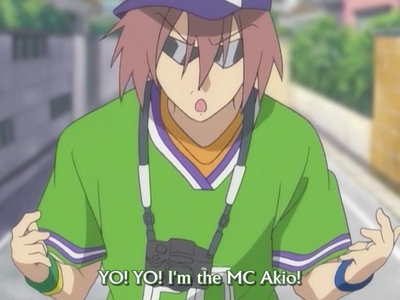
But, as I said in the beginning of this review, this anime is not meant for everyone. Here I will be discussing the common problems/refutes people make when complaining about this show, and I will refute them to try to convince you a bit that you may have looked the wrong way.
-
"It's too boring." - People who usually say this are people who watched Clannad thinking its like Toradora or SAO, with a bunch of action or drama that drives the story. Clannad isn't like those two. It immerses the viewers in the perspective of Tomoya. Clannad is a Slice of Life, not a dramatic romance.
-
"It's way too slow" - This I can kind of understand this. The first season goes around introducing each character with their own arc, so when it does get to the final episode of the first season, the viewers feel drawn out. But like I said earlier, this is a Slice of Life that draws the viewers and immerses them in their world. And the only way the characters can come off meaning is by giving them their own arcs. So in the end, it's not wasted episodes.
-
"Where is the sad part?" - This is something I have major concerns with. If everybody came to watch the sad part and the sad part only, then this entire first season didn't need to exist. The whole entire reason why the sad part is sad (somewhere in the second season) is because the entire show (first and second season) builds up to it. And the reason why it's so heavy and impactful is because it happens to the characters that we watched up to this whole time. So if you're watching Clannad just for the sad part, either stop watching because you're not going to feel sad, or take a step back and enjoy every part of it.
-
"It's overrated and hyped up so much." - It may be overrated because of how popular it is, and how much people gush over it. I was like that too thinking no show was going to make me cry, but I was wrong when I watched this. This show made me change my perspective when it comes to watching shows and to take them how they are meant to be taken. And hopefully if you could take the time to watch Clannad again with that idea in mind maybe you could grasp why people refer to this show like how they do.
-
"Where is the romance" - The romance of Clannad does not come to the forefront so easily. The build up of the first season onto the second season is key. The interactions that Nagisa and Okazaki had were developed (slowly) so that they can fully flesh out into a couple in the second season. The romance here is intimate. I don't think it is anywhere direct in its portrayal of romance in both season, but it does not have to be that way. Romance can be interpreted in different ways. Some like it slow and some like it fast. But being able to appreciate both ideologies is what makes watching Clannad a wonderful show to watch.

Conclusion:
I do not think Clannad is for everyone. The romance in this show is slow, and the progression of the story is slow. But if you are here for a fast romance, then this is not your show. Sit down, lose the sense of time, and enjoy the ride. I want to express how much Clannad means to me and I want you to understand the same.Should you watch Clannad? Definitely.
-

TailsREVFOX
98/100Clannad - Análise e Enredo PT-BRContinue on AniListTodos nós já assistimos ou pelo menos conhecemos algum drama. Devemos levar em consideração a vasta galeria de diversos tipos desse gênero. Mas em minha humilde opinião, esse supera é muito qualquer expectativa. A obra tem a seguinte sinopse: Tomoya Okazaki é um dos protagonistas principais de Clannad. Devido ao seu hábito de sempre chegar tarde à escola, matar aulas durante o dia e ficar fora toda a noite, ele foi rotulado como um delinquente (um jovem que desafia a autoridade). Logo início do primeiro episódio, Tomoya é mostrado como um estudante do ensino médio de 17 anos que se ressente da sua cidade por causa de todas as más lembranças que ele experimentou enquanto vivia nela. Ele é o tipo de pessoa que tem pensamentos profundos sobre sua vida, mas geralmente não fala sobre eles. Em vez de cair em depressão, porém, ele se torna um delinquente sarcástico. Mas Clannad não é um anime que retrata só a vida de um, mas de vários jovens durante o período colegial. Enquanto ele caminha a roda do colégio, ele avista a personagem Nagisa. Vale ressaltar o ponto forte do anime, que são os personagens carismáticos, muito deles são muito fáceis de se criar um laço. Kyou, Kotomi, Tomoyo, Fuko, Yukine, Ryou. E todos com o passar do drama vão mudando e se desenvolvendo de uma forma muito bonita, a maioria até descobrem o que deveriam realizar em suas vidas, e os rumos tomados. Segundo ponto forte sem dúvidas é o seu incrível desenrolar, vai demorar muito tempo para que exista um drama tão bem elaborado como Clannad proporcionou – demostra a atitude dos muitos protagonistas, o fato de que nem tudo pode ser resolvido facilmente, tem muitas falhas que terão de passar na sua vida e que vão lhes ajudar a tornar uma pessoa melhor, e nisso Clannad é mestre, sem dúvidas, não é atoa que o mesmo sempre fica em altas colocações em tops como este, provando somente que ele cumpriu e superou o que era de se esperar.
A ost de Clannad é incrível, ela consegue absorver o máximo de cada cena, e isso só acontece quando o diretor da staff do anime sabia o que estava fazendo e tem experiência para saber como utilizar as osts de maneira correta, existe uma imensidão de animes em que as músicas não chamam a atenção e bem poucos em que ela é realmente necessária para a cena, este é um dos casos.
Aqui com certeza é uma das maiores qualidades do anime, já que ele foi animado pela Kyoto Animation, muito conhecido por ser um dos melhores estúdios, se não o melhor estúdio de animação do japão, então sem dúvidas quanto a palavra “qualidade” este anime impõe e muito. Um detalhe quanto ao carácter do design, que o estúdio estava sem seu ápice na época em qualidade, mesmo se for uma pessoa exigente quanto a animação, pode ir assistir sem medo.
Nunca fui um fanático por animes mas sim, eu amo, esse foi um anime capaz de mudar meu pensamento de viver. Clannad sem dúvidas foi um anime que mudou minha forma de pensar e encarar a realidade, eu me arrependo fortemente por não ter assistido antes, então os créditos por apresentação do anime fica para meu amigo Lucas (Exclamaniac!). Julgo este anime como essencial para todos, posso dizer a você, que vai ser sempre lembrado pelo resto da minha vida.
Em baixo, minha análise em vídeo =)

TheRealKyuubey
30/100My review of the anime ClannadContinue on AniListA long time ago, I found a bottle floating in the ocean off the coast of Santa Monica. It contained a lengthy research paper, allegedly belonging to a renowned pair of married scientists who had disappeared at sea years prior. I never told anyone about this paper… I mean, after I read it, how could I? It spoke of concepts that frightened me, and the idea of handing it over to anyone in authority chilled me to the bone. I could never hand this thesis over to my own government, because I just knew someone would try to use the information contained within to develop weapons that could destroy the very fabric of existence as we knew it. See, this thesis spoke of alternate timelines… I know, big shock right? The multiverse has been existing in the minds of scientists for years now, but here’s the thing Never has the method for accessing those timelines been so perfectly realized.
The paper spoke of a unique world where everything… And I mean everything, from the movement of the stars to the fate and decisions of every individual human… Revolved around the whims of one perfect teenage boy, who thankfully was too apathetic to harness his true powers, with which he could easily mobilize an army of obsessive, sexually-frustrated moe girls. Out of all the millions of alternate versions of this universe, there were some where people believed his plight to be pinnacle of emotional depth and perfection in story-telling… And in other realities, people claimed that his story was sick, pathetic wish fulfillment and tragedy porn. And that, in heavily simplified terms, is how you access these multiple realities… You create a universe so divisive that every single person who experiences it has a radically different experience with it, and accept that every single one of those opinions is somehow correct.
That world is called Clannad, and it is beautiful. I mean aesthetically, and in terms of animation? This show is gorgeous. Unsurprisingly, it was produced by Kyoto Animation, the patron saints of good looking anime, and as you may have expected from my only other Kyoto Animation review (Free), Clannad obviously had a lot of love and money poured into it A wide range of motion and visual effects is used throughout the series, effortlessly switching between the mundane shots of people walking and talking together, to the fast paced actions shots of over-the-top fights breaking out on campus, to beautiful CGI that gets used sparingly and never looks out of place, and at no point is it ever apparent that the producers had to bother saving a single penny.
Well, that turns out to have been a very good choice, because this series is based on a KEY visual novel, which means it carries with it a very distinct sort of design. I’ve seen the term “Moe-blob” used to describe this design, where male characters have reasonably realistic facial proportions but their female counterparts have giant, tumorous doe-eyed countenances, and it certainly applies here, as this is the kind of show that would look like walking garbage if it weren’t produced with the budget of a small country. PA Works might have been a better fit, but comparison aside, Kyoto Animation knew exactly what they were doing with this title. Big eyes can easily look like dead eyes, but Kyo-Ani took full advantage of those giant peepers in order to channel an entire spectrum of emotions that breathe full, vibrant life into what would otherwise be unrealistic and unrelatable visual novel tropes.
Like the animation, the music is diverse, had a lot of love and attention put into it, and can cover a wide variety of moods, and it works… Most of the time? Okay, positives first, emotional highlights are very well tended to, and the music that plays during those ‘other world’ segments is hauntingly appropriate. The Insert song “Dango Daikazoku” appears very prominently as an in-universe song that the cast is aware of, as well as the ending theme for the series. Where the soundtrack unfortunately falters is in it’s quieter, more mundane moments, where characters are just standing around talking. The music playing in support of these moments could best be described as generic, as it sounds like plenty of these tracks were ripped directly from the backgrounds in the game and played on loop. Honestly, there are times throughout the series where those tracks just wind up coming off as annoying, overpowering the dialogue rather than supplementing it.
And as for the dub… Oh boy. We’re about to enter sticky territory with this one. Granted I’ve been in this territory before, but not under these circumstances, so bear with me. In fall of 2014, veteran ADR director Steven Foster quit his job with Sentai filmworks. In a very revealing interview, he later trashed many of the shows he had worked on, relating the intense fan hatred of his work to the fact that the work itself was unsalvageable. One of these shows was Clannad, which he didn’t understand and found entirely unrelatable, so he basically just covered his ass by casting people he knew he could trust to handle the roles. Ever since release, Clannad has been considered one of the worst english dubs of all time, the quintessential example of Mr. Foster’s dubious talents, and… I don’t really get why.
Okay, let me start off by saying I don’t think this dub is very good. There are tons of little hiccups in the dialogue, such as awkwardly worded lines like “He’s that retired charismatic musician” and “I don’t know where the taking seriously even begins with you,” that would honestly sound right at home coming out of the mouths of Johnny and his best friend Mark, but in my opinion, Foster’s instincts were more or less spot-on when it came to casting this show. David Matranga is one of my favorite voice actors of all time, and while he’s limited to deep voiced characters, he can utilize a lot of humor and drama within that limit, which made him the perfect choice for the main character, a 17 year old delinquent with a troubled home life and a penchant for pulling pranks. Luci Christian turned up the kawaii-ness to play his gentle and sensitive love interest, and Greg Ayres was on fire in his typecast role as Sunohara, even if I’ll admit his character was changed from interesting to insufferable in the rewrites.
I mentioned in my Angel Beats review that Emily Neves was a bit on the mediocre side, and that her co-stars were way out of her league. Was that too mean of me? Well, I hope this redeems me… Following Angel Beats, she got really good, really fast. She’s turned into a very subtle and natural sounding actor, which helped to save the otherwise questionable character of Kotomi, and of course, Hilary Haag was a natural choice to play the dippy Fuko. My only serious complaint is with the two twins Ryou and Kyou, and I’m sorry, but as good as Shelley Callene-Black can be when handled properly, she sounds like a forty year old, and has no business playing a teenager… Even a gruff one. Brittany Karbowski plays her more diminutive sister to a somewhat better degree, but it kills me to hear such a multitalented actor get stuffed into such a one note role. I kind of wish they’d cast her as both sisters, using different tones and speech patterns for each. But aside from that, I have no idea why the dub is so reviled, because it’s nowhere near as bad as Angel Beats was, and I see no problem in recommending both languages.
As for Steven Foster’s other complaints? Well, I’m personally of the opinion that an ADR director shouldn’t call a project unsalvageable, even if it’s a terrible show in general. Master of Martial Hearts has to be one of the worst anythings I’ve ever seen, but damn it if Funimation didn’t put all of their effort into dubbing that turkey. No anime is bad enough that dubbing it is a waste of time, and if you think it is, you should probably hand the responsibilities to somebody else, rather than slogging through a project you don’t want to do. Having said that, I will very begrudgingly admit that his comments about this particular series aren’t entirely unfounded.
We’ll start with the obvious one; He claims Clannad is difficult to understand. This is sadly true for a lot of people, and I’ll freely confess that I was taking the supernatural elements of the series with a grain of salt until somebody sat down and explained them to me. In addition to the main story, which is somewhat confusing in it’s own right, there are two plot lines that can leave viewers scratching their heads. The first is the multiple universes, an idea that gets brought up in seemingly random fashion until you smack your head for overthinking it and write it off as an excuse to have different paths from the game adapted into OVA episodes. At least it makes more sense here than when Umineko tried to explain it. The other is a strange, haunting subplot about a lonely little girl building herself a sentient robot friend and bouncing existential questions off of him. There’s also magic tying emotions to the town, and once I had it explained to me it DID make some of the more questionable occurrences seem clearer, but you’d have to be paying extra close attention during the sequel series to pick up on any of that for yourself, and none of it really adds any depth to the story, they just explain things a bit. I’d go as far as to say there’s no shame in just taking the supernatural material with a grain of salt.
So what about his other complaint, that he couldn’t relate to the characters? Well, that’s like saying Peter Griffin would make a bad party guest. There is nothing realistic or believable about literally any of the characters in this show, the things they do, the things they say, or the way they relate to each other, and this can all be connected back to the fact that it was based on a visual novel. A visual novel, for people who don’t know, is a text-heavy dating game where you pick the romantic option you like the most out of a handful of options, and perform tasks to raise their affection levels so you can pork them. Turning this format into a series is not an easy thing to do, I admit, but that doesn’t excuse any show from sucking at it.
Remember how in Toradora, the main character started off without a single girl interested in him, and he eventually wormed his way into the hearts of three girls as they got to know him and understand his value? Well, out of Tomoya Okazaki’s options, there are two girls who already love him right from the get go, one who loves him but is in denial, and two who don’t immediately love him but instantly trust and get along with him. To be fair, the writers took the extra effort to give him a personality, but that doesn’t make up for him and Nagisa’s parents being the only characters with any emotional depth. Sunohara’s entire purpose is to act like an obnoxious pervert just to make Tomoya seem more cool as a result(and he gets worse in season 2), and the female characters run the gamut from infantile pansies to obsessed harpies whose every goal in life revolves somehow around either winning Tomoya or giving him tasks to complete to win them.
And that’s basically how the plot of this anime unfolds… On the path to completing the main quest, for the main girl, Tomoya has to complete various tasks to satisfy the other minor arcs, for the other girls. Each accomplishment unlocks a new girl’s challenge, which frustrates me to no end. According to Clannad, you can’t form or strengthen a relationship with somebody without doing elaborate chores for them. In order to get somebody to come out of their room, you have to weed their yard and plant a new flower garden for them. If you want to get someone elected student council president, you have to take them around and have them participate in a bunch of athletic club activities, which they couldn’t possibly do themselves. You can’t confess your feelings to a girl who’s obviously showed signs of liking you since episode 3 until you take her by the hand and practically drag her through all the processes of starting and maintaining the club she kinda sorta wanted to join, and no, I’m not making any of that up.
Essentially, Clannad… This oh so romantic classic… Paints dating in such a way that perpetuates the classic toxic attitude of entitlement. You don’t have to worry about physical attraction, mutual respect, chemistry, or any of that complicated stuff… If you paid fifty dollars for dinner and she didn’t put out, something must be broken in the game. From date rape to people simply getting pissed that you didn’t thank them for saying God Bless You, entitlement is an ugly thing, especially when you force yourself upon peoples’ lives in ways they don’t want or need. As Parker J. Palmer put in a recent column called The Gift of Presence, The Perils of Advice, “The human soul doesn’t want to be advised or fixed or saved. It simply wants to be witnessed — to be seen, heard and companioned exactly as it is. When we make that kind of deep bow to the soul of a suffering person, our respect reinforces the soul’s healing resources, the only resources that can help the sufferer make it through.”
So, why does Tomoya feel the need to meddle in every single thing? Why can’t he just connect with people on an interpersonal level? Because you’re supposed to be able to insert yourself into this character, and if you’re the target audience for visual novels… Lonely Japanese men who can’t get laid because women refuse to marry early out of fear that the legal bondage of marriage will destroy their hopes of having a career… Are presented with simple binary choices from women who are already openly accepting of the idea of polishing his knob, and will happily reward him for making all of their clearly and explicitly established dreams come true. I’d just like to point out that I was diagnosed with Asperger’s syndrome at age 4. I’m legitimately socially retarded, and this shit even sounds pathetic to me.
The reason I started this review off with a sarcastic plot synopsis is because I just didn’t know how to describe the plot accurately without jumping right into some of my negative comments. There’s a lot of stuff that happens throughout the series, but since I’m only reviewing the first season in this post, the usable plot boils down to who Tomoya is going to pick, which is a very hard climax to relate to any of the melodrama that set it up, especially since the reward it was driving towards was something that could have been taken care of within a six episode ova. God forbid the series starred normal people, or the important love connection could have been made THAT early, cutting off the most obvious will-they-wont-they scenario since Love Hina right off at the pass.
So now that I’ve gotten all of that off my chest, was there anything redeeming about this series? Yes, and quite a bit. Out of all the story arcs, with Tomoya leading hapless child-like girls around by the wrist while they thirst for his dick, there’s one arc featuring a much more believable child who DOESN’T have a wide-on for him. That girl is Fuko, and if you’re able to ignore the egregiously unfunny Suzohara/Tomoyo skits that happen throughout, it’s by far the most compelling arc of this season. What she wants, where she’s coming from and what she has to go through is damn near tear-jerking, and it feeds into the main plot way more than the others. And aside from that, there are a lot of jokes that are objectively funny, and none of them involve the comic relief character, Sunohara. Hell, Tomoya’s practical jokes are the funniest content available, and his joke on Sunohara just happens to be the one that drags on for too long. Unfortunately, a handful of good jokes don’t make up for a truckload of bad ones, so take what you can get, I guess?
Clannad is available from Sentai Filmworks. It can be purchased in affordable quarters if you’re not interested in the dub, but if you are, good luck, because after over five years, the sixty dollar price tag has only dropped to about 40 dollars as an occasional sale price. The set comes packaged with a special OVA episode replacing the main girl with one of the side girls, and it exists. A second season called After Story is also available, and while pricing is virtually the same, I’ll be reviewing that very soon. A film is also available stateside, but true to Key’s roots, it’s only a cash-grab retelling of the series. There are tons of manga and game entries that are available in Japan, but as far as I’m aware(correct me if I’m wrong) none of them have been released stateside, as visual novels are not as familiar a thing to westerners as they are to Japan.
Have you ever wondered why this anime is called Clannad, and what connection(if any) it has to the Irish band of the same name? Well, there’s a funny story behind that. Jun Maeda picked it because he mistakenly believed it was the gaelic word for family. It’s not, of course, it’s actually a portmanteau of two different words essentially referring to an old Gaelic clan. Not only does this story never fail to impress other nerds at parties, but it also illustrates what sets Clannad apart from the other visual novel shows of it’s ilk… The fact that it is so ungodly pretentious. It’s so easy to laugh at the ‘deeper’ subplots as soon as you hear the phrase “The magic orbs are just dragon balls.” I don’t agree with the people who claim that it’s the worst anime of all time, and I’d rather not have any physical contact with people who call it one of the best anime of all time, but I guess I can understand where both parties are coming from. Me, I think there’s merit to this series, and that it’s worth seeing based on it’s technical prowess and the obvious amount of ambition that went into it, but over-all, it’s this kind of emotionally manipulative, cliche-ridden, socially out-of-touch series that the word ‘overrated’ was invented for. I give Clannad a 3/10.
SIMILAR ANIMES YOU MAY LIKE
 ANIME ActionAngel Beats!
ANIME ActionAngel Beats! ANIME Drama3-gatsu no Lion 2
ANIME Drama3-gatsu no Lion 2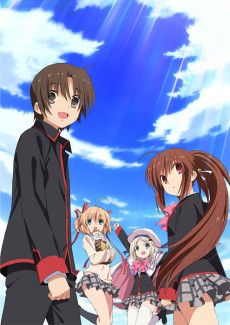 ANIME ComedyLittle Busters!
ANIME ComedyLittle Busters!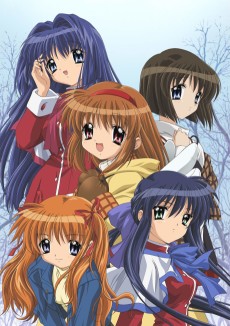 ANIME DramaKanon (2006)
ANIME DramaKanon (2006)
SCORE
- (3.85/5)
TRAILER
MORE INFO
Ended inMarch 28, 2008
Main Studio Kyoto Animation
Trending Level 3
Favorited by 5,765 Users



